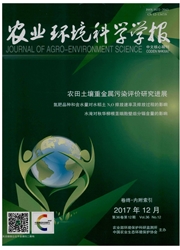

 中文摘要:
中文摘要:
城镇化快速发展迫切要求对日益增加的城市污泥进行有效处理,为此尝试将其通过热解工艺制成生物炭,作为有机肥料添加剂来改善有机肥品质,通过考察污泥生物炭对猪粪堆肥的影响,并在锰污染土中施加肥料栽培白菜,重点探究500℃热解污泥生物炭肥料对土壤物理化学和微生物性质以及白菜产量的影响。结果表明,热解能增加污泥生物炭的比表面积和提高p H;生物炭的添加能加快堆肥速度,提高堆肥品质;生物炭肥料在盆栽过程中能有效改善土壤性质(如提高p H和电导率,增加细菌和真菌群落总数,使脱氢酶和脲酶活性增强,提高氨氧化古菌和氨氧化细菌的浓度),增加白菜产量,同时降低重金属锰的有效性,将部分酸溶态锰转化为残渣态。
 英文摘要:
英文摘要:
With the rapid urbanization, sewage sludge, an inevitable major byproduct of wastewater treatment, is being produced massively with dramatic increase and is thus required to be treated effectively. In this work, sewage sludge was converted into biochar through pyrolysis and then composted into a compost fertilizer with pig manure. Effects of sludge biochar on the composting and of sludge biochar based com-post on the physic-chemical and microbial properties of a manganese-contaminated soil were investigated. Results show that the BET-sur-face and pH of sewage sludge biochar largely increased after pyrolysis. Addition of sludge biochar accelerated the composting process and improved the quality of the compost. Sludge biochar based composts significantly improved soil pH and electrical conductivity, increased bacterial and fungal community population, and enhanced activities of dehydrogenase and urease. Quantities of ammonia-oxidizing archaea and ammonia-oxidizing bacteria in soil were also increased by applying sludge biochar based composts. Applying sludge biochar based compost caused the partial conversion of acid-soluble manganese into residual fraction, decreasing the bioavailability of soil manganese, and in turn increased cabbage yield greatly.
 同期刊论文项目
同期刊论文项目
 同项目期刊论文
同项目期刊论文
 Adsorption of Cr(VI) on bamboo bark-based activated carbon in the absence and presence of humic acid
Adsorption of Cr(VI) on bamboo bark-based activated carbon in the absence and presence of humic acid 期刊信息
期刊信息
